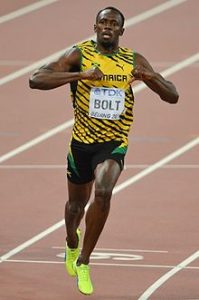 How many chicken nuggets can you eat in a day? What if I asked you to consume only chicken nuggets while simultaneously performing a high-endurance sport, like running 100 metres in under 10 seconds? Sounds impossible, right? What if I told you that the fastest man on earth set world records while eating chicken nuggets exclusively for 10 days? Not just one, but three records. Unbeatable for the last 15 years, he still holds the title of the “Fastest Man on Earth.” This feature of Sunday Shillong explores Usain Lightning Bolt’s unbeatable feat and his Olympic experience in Beijing, China.
How many chicken nuggets can you eat in a day? What if I asked you to consume only chicken nuggets while simultaneously performing a high-endurance sport, like running 100 metres in under 10 seconds? Sounds impossible, right? What if I told you that the fastest man on earth set world records while eating chicken nuggets exclusively for 10 days? Not just one, but three records. Unbeatable for the last 15 years, he still holds the title of the “Fastest Man on Earth.” This feature of Sunday Shillong explores Usain Lightning Bolt’s unbeatable feat and his Olympic experience in Beijing, China.
 Before diving into Bolt’s crispy nuggets story, let’s take a quick look at the history of the Olympics. The Olympics boast a 2000-year-old tradition of linking sports and culture. The first official Games date back to 776 BC and were held every four years in honour of the Greek God of the sky and thunder, Zeus. In 393 AD, the Roman Emperor Theodosius I banned the Olympic Games for religious reasons, claiming they encouraged paganism. They were revived in the modern era by Baron Pierre de Coubertin at the first Olympic Congress in Paris in 1894. With the creation of the International Olympic Committee (IOC), the first modern Olympics were in Athens in 1896, followed by the Paris Games in 1900, which introduced women’s participation for the very first time. Since then the Olympics have been held every four years (The History of Olympic Games: Kalliopi Sakavitsi, Olympics website)
Before diving into Bolt’s crispy nuggets story, let’s take a quick look at the history of the Olympics. The Olympics boast a 2000-year-old tradition of linking sports and culture. The first official Games date back to 776 BC and were held every four years in honour of the Greek God of the sky and thunder, Zeus. In 393 AD, the Roman Emperor Theodosius I banned the Olympic Games for religious reasons, claiming they encouraged paganism. They were revived in the modern era by Baron Pierre de Coubertin at the first Olympic Congress in Paris in 1894. With the creation of the International Olympic Committee (IOC), the first modern Olympics were in Athens in 1896, followed by the Paris Games in 1900, which introduced women’s participation for the very first time. Since then the Olympics have been held every four years (The History of Olympic Games: Kalliopi Sakavitsi, Olympics website)
 Back to the nuggets story. In his autobiography “The Fastest Man Alive,” Usain Bolt candidly revealed his unconventional diet during the 2008 Beijing Olympics, where he consumed a staggering 1,000 chicken nuggets throughout his 10-day stay, meaning 100 pieces a day. “Honestly, I ate nothing else in all my time out in China except chicken nuggets,” Bolt wrote in his book. “They were the only food I could properly trust which wouldn’t affect my stomach. On arriving at the [pre-Olympic] training camp I tried a local Chinese meal, which wasn’t like the ones we eat in the West, and my body didn’t react well. So, knowing I could rely on nuggets, I made up my mind that was all I would eat. And eat them I did, for breakfast, lunch and dinner, washed down with bottled water” (The Fastest Man Alive: The True Story of Usain Bolt, an autobiography by Usain Bolt).
Back to the nuggets story. In his autobiography “The Fastest Man Alive,” Usain Bolt candidly revealed his unconventional diet during the 2008 Beijing Olympics, where he consumed a staggering 1,000 chicken nuggets throughout his 10-day stay, meaning 100 pieces a day. “Honestly, I ate nothing else in all my time out in China except chicken nuggets,” Bolt wrote in his book. “They were the only food I could properly trust which wouldn’t affect my stomach. On arriving at the [pre-Olympic] training camp I tried a local Chinese meal, which wasn’t like the ones we eat in the West, and my body didn’t react well. So, knowing I could rely on nuggets, I made up my mind that was all I would eat. And eat them I did, for breakfast, lunch and dinner, washed down with bottled water” (The Fastest Man Alive: The True Story of Usain Bolt, an autobiography by Usain Bolt).
 Bolt’s decision was driven by trust issues regarding the local food and a pragmatic need to ensure nothing jeopardised his performance. He humorously recounted his reliance on a 20-piece chicken nugget box from a well-known fast-food chain, which he consumed for every meal. These small pieces of reconstituted boneless chicken meat that have been battered and deep-fried roughly contain 30 calories a piece (as per the U.S. Dept. of Agriculture). This means his daily calorie count was around 3,000 kcal. Most athletes performing high-endurance activities maintain this level of calorie consumption and hence, this calorie-dense diet, which sounds unhealthy, didn’t deter his training. Rather, his performance excelled and by the end of the event, Bolt set an unbeatable record by sprinting 100 metres in just 9.69 seconds at the 2008 Beijing Olympics and also broke the men’s 200-metre sprint record. Additionally, the Jamaican team, which included Bolt, won gold medals in the 4×100 metres relay in the same year (Olympics News).
Bolt’s decision was driven by trust issues regarding the local food and a pragmatic need to ensure nothing jeopardised his performance. He humorously recounted his reliance on a 20-piece chicken nugget box from a well-known fast-food chain, which he consumed for every meal. These small pieces of reconstituted boneless chicken meat that have been battered and deep-fried roughly contain 30 calories a piece (as per the U.S. Dept. of Agriculture). This means his daily calorie count was around 3,000 kcal. Most athletes performing high-endurance activities maintain this level of calorie consumption and hence, this calorie-dense diet, which sounds unhealthy, didn’t deter his training. Rather, his performance excelled and by the end of the event, Bolt set an unbeatable record by sprinting 100 metres in just 9.69 seconds at the 2008 Beijing Olympics and also broke the men’s 200-metre sprint record. Additionally, the Jamaican team, which included Bolt, won gold medals in the 4×100 metres relay in the same year (Olympics News).
 Usain Bolt’s remarkable performance in Beijing, fuelled by an unlikely diet of chicken nuggets, remains one of the most memorable moments in Modern Olympic history. His story is not just about breaking records but also about the determination and adaptability that define true champions. As we anticipate the 2024 Summer Olympics starting July 26, in Paris, Bolt’s legacy continues to inspire athletes around the world, reminding us that greatness often comes with a side of unexpected choices.
Usain Bolt’s remarkable performance in Beijing, fuelled by an unlikely diet of chicken nuggets, remains one of the most memorable moments in Modern Olympic history. His story is not just about breaking records but also about the determination and adaptability that define true champions. As we anticipate the 2024 Summer Olympics starting July 26, in Paris, Bolt’s legacy continues to inspire athletes around the world, reminding us that greatness often comes with a side of unexpected choices.
In the previous Olympics edition, Tokyo 2020, India sent its largest contingent of 124 athletes. It achieved its best-ever haul of seven medals, highlighted by Neeraj Chopra’s historic gold in the men’s javelin throw. This year, sixty-three athletes from India are training at their peak performance to compete in 13 sports categories against the world’s best, next month in Paris (Olympics website).
– Jnanendra Das



